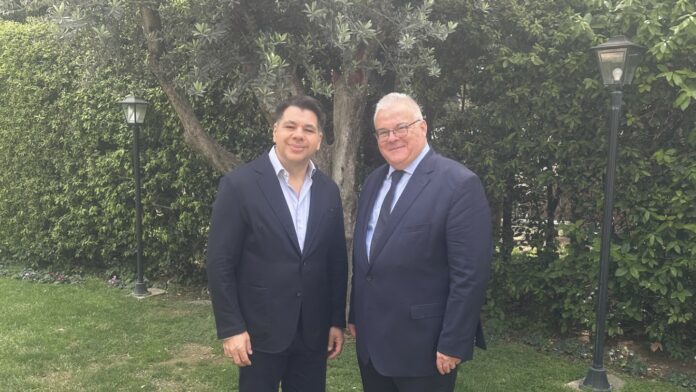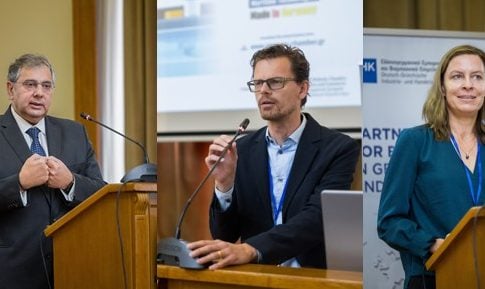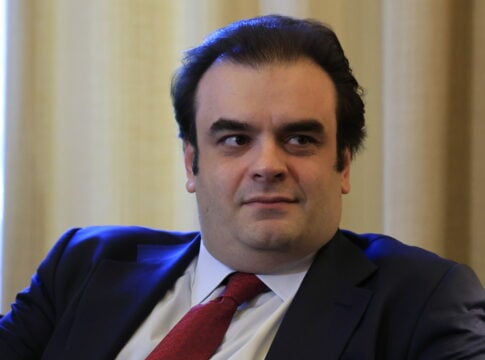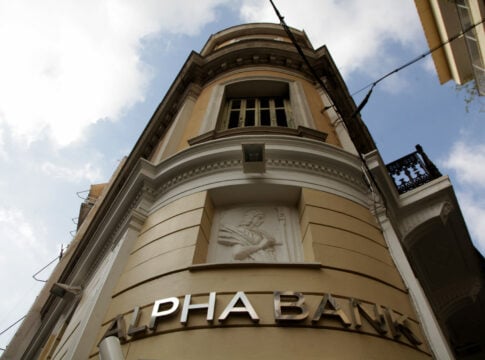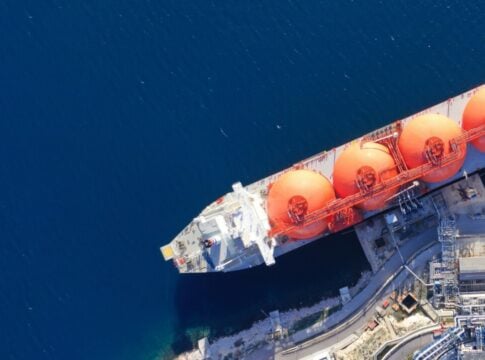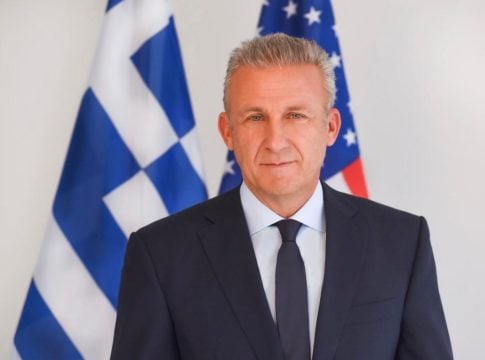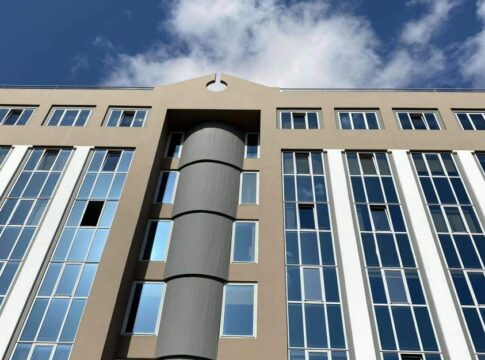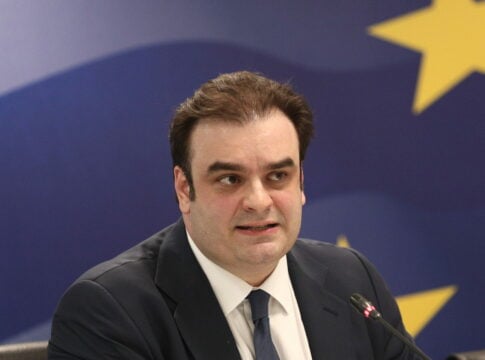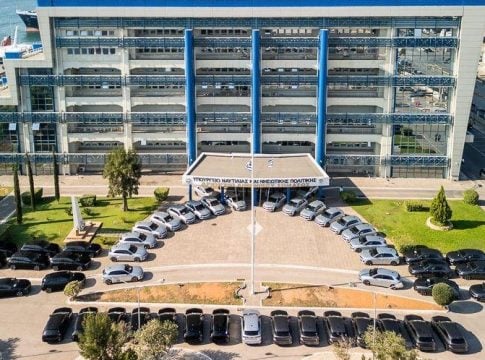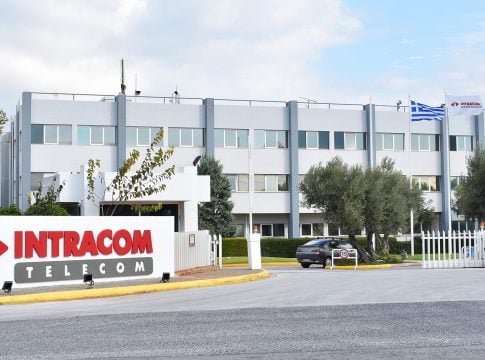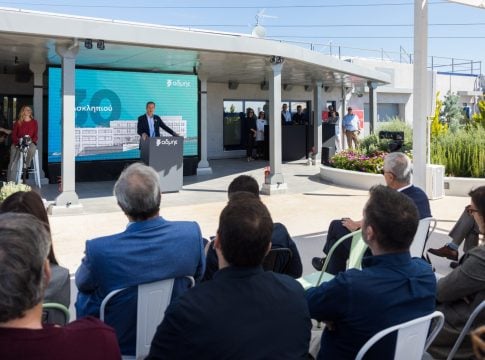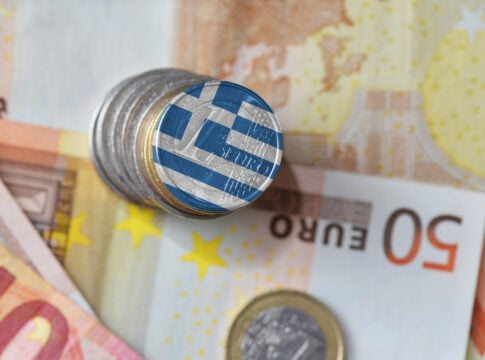The United States invest in Greece’s success, US Ambassador to Greece George Tsunis said in an interview with “Naftemporiki” and Michalis Psilos, adding that he’s proud of the work the two countries have done to support their economies and expand the ties between the two peoples.
“Our ties span trade and investment, energy, education, and defense. We’re working together to face the challenges of the future: building inclusive economies, defending democratic ideals in Ukraine, addressing climate change, and advancing the rights of all people,” he noted.
Regarding energy, Tsunis stated: “Greece is a global leader when it comes to the percentage of its electricity generated from renewable sources of energy. Companies such as GE and 547 Energy have invested millions in new developments. “
The full interview of US Ambassador Tsunis to Michalis Psilos follows:
What have you gained from your time in Greece during these years?
Serving the United States as Ambassador to the Hellenic Republic these past two and a half years has been the honor of a lifetime. I have gained an even deeper appreciation for the profound ties that connect the United States and Greece and a new optimism for what the future of this relationship holds. I’ve also gained new friends across this incredible country, and that’s something I’ll proudly carry with me even as I leave my role as ambassador.
How did you perceive life in Greece over these years? The daily life of Greeks, the course of the economy, the successes, as well as the challenges?
U.S.-Greece ties are the strongest they’ve ever been and I feel lucky to have served here as Ambassador during such a dynamic time in our relationship. Our ties span trade and investment, energy, education, and defense. We’re working together to face the challenges of the future: building inclusive economies, defending democratic ideals in Ukraine, addressing climate change, and advancing the rights of all people. On a personal note, I’ve loved my daily life here: the walks, the food, the history and culture, and most importantly, the people.
How do you view the current level of U.S.-Greece relations?
Ties between the United States and Greece are getting stronger every day. Our growing bilateral and transatlantic relationship is founded on shared democratic values and interests. The United States is invested in Greece’s success, and I’m proud of the work our two countries have done to support our economies and expand the ties between our two peoples. I’m also proud that the United States is Greece’s international educational partner of choice and that Greece has risen to become a top-ten destination for U.S. students worldwide. I’ve been impressed with Greece’s leadership both in the region and on the world stage, especially on renewable energy, and look forward to exploring further opportunities in that space.
How are trade relations between the two countries developing?
The world has taken notice of the resilience of the Greek economy and the exciting opportunities it presents for trade and investment. It was big news when Greece returned to an investment-grade sovereign debt credit rating, and this attracted new U.S. and international investment. It’s worth highlighting that the United States was the seventh-largest source of foreign direct investment in Greece between 2013 and 2023. And U.S. investments are poised to grow: investments in Greece by Applied Materials, AWS, Chubb, Deloitte, Digital Realty, Google, J.P. Morgan, Meta, Microsoft, Pfizer, and others are projected to have an economic impact worth billions of dollars over the next few years. Data centers and digital technology are an exciting area of growth as more and more firms choose to take advantage of Greece’s strategic position to establish regional hubs. I’m pleased to see that U.S. companies are investing significantly in the creation of data centers throughout the country.
How is the strategic partnership between Lockheed Martin and the Hellenic Aerospace Industry (HAI) progressing? How much will this cooperation benefit the Greek defense industry?
I’d actually like to zoom out a bit and talk about defense industry collaboration more broadly. Back in January, my government released its first ever National Defense Industrial Strategy, which will shape how we engage, develop, and invest in this area in the next three to five years. The goal here is to catalyze generational change towards a more robust, resilient, and dynamic modernized defense industrial ecosystem. And our cooperation with Greece is a part of that. Cooperation and coordination between the entire U.S. government, private industry — and companies like Lockheed Martin are a key part of this — and international allies and partners will play an increasingly important role in our collective defense, to the benefit of the United States and Greece.
Mr. Ambassador, several U.S. companies have initiated or are carrying out significant investments in Greece. How do you see the evolution of economic cooperation between Greece and the United States?
I’ve been pleased to see the expansion of economic cooperation between the United States and Greece into new and exciting areas, including those that will help ensure the region’s energy security and contribute to combatting climate change. Greece is a global leader when it comes to the percentage of its electricity generated from renewable sources of energy. Companies such as GE and 547 Energy have invested millions in new developments. The United States’ International Development Finance Corporation, or DFC, in November 2023 committed to investing $125 million in the rehabilitation of Elefsina Shipyards. In addition to creating new high-quality jobs for local workers, this investment provides a place to repair LNG vessels – bolstering regional energy security – and will support Greece’s green transition by eventually providing wind turbine assembly services. We recognize that there is even more room for growth in this field and DFC is exploring additional opportunities in Greece and the region.
Next May, Athens will host one of the largest defense exhibitions in Europe, with exhibitors and attendees expected from over 100 countries. The U.S. Pavilion is being organized by the American-Hellenic Chamber of Commerce and will be a “must see” for visiting delegations and those looking to expand business opportunities in this critical region. DEFEA is the ideal forum for all to network and accelerate co-production opportunities in the most critical spaces, whether those be preparedness for wildfires and natural disasters or protecting national power grids. DEFEA isn’t just an expo for those in uniform, so we encourage early engagement and broad attendance.
Do you foresee an increase in investments from Greek companies in the United States?
As the Greek economy continues to grow, I expect more and more Greek companies will look to expand into the U.S. market. We regularly see news of Greek companies bringing their innovative and high-quality products to U.S. consumers. Greece’s Sunlight Group is investing $40 million to build a state-of-the-art lithium battery assembly plant in North Carolina through Sunlight Batteries USA, while Hellenic Cables recently launched the United States’ first utility-scale offshore wind farm, New York, powering 70,000 homes in Long Island with clean energy. I’d also note the important role that U.S. capital played in helping Greek businesses through the economic crisis of the last decade.
Mr. Tsunis, you have repeatedly emphasized the need to strengthen Greek-Turkish relations. How optimistic can we be, however, when Ankara continuously makes baseless claims that are against international law in the region?
We welcome recent meetings between leaders and encourage maintaining calm in the Aegean and the Eastern Mediterranean among NATO Allies.
What is your view on Prime Minister Kyriakos Mitsotakis’ proposal for creating a European air defense “shield” in the coming years? Are you concerned about the potential expansion of the Russian-Ukrainian war into Europe?
It’s not my place to comment on European defense plans and I’d refer you to them on that. I will say that on Moscow’s war of aggression, we stand steadfastly by Ukraine and the Ukrainian people who are defying the Kremlin’s attempt to redraw their country’s borders by force. They are fighting valiantly and heroically though Russia continues to brutally strike hospitals and infrastructure. Unfortunately, Moscow also continues to dump artificially cheap natural gas into the European market, undercutting efforts to ensure these new alternative routes remain commercially viable. We need to remain focused on the truth: Russian gas is not cheap; it carries a very high political price that jeopardizes our collective security. We need to continue supporting efforts to diversify gas routes into the region, such as the Vertical Corridor initiative. These projects – once completed and fully utilized – will provide countries from Greece to Ukraine a secure and affordable source of energy that does not carry the high risks of Russian gas.
Mr. Ambassador, I noticed that the Embassy’s Independence Day celebration this year was held at the Megaron, a change from years past. What led you to make this change?
I’d like to highlight an issue that we focused on as our theme for this year’s Embassy Independence Day celebration. It’s the theme of accessibility and inclusion. We noticed that not all of our spaces at the Embassy were accessible, that there was more we could be doing to ensure that we were not unintentionally excluding guests, colleagues, and members of our community from our spaces. We learned a lot from asking critical questions of ourselves and seeking to find solutions that would benefit all people. One in five people has a disability – and we often see that women disproportionately take on the role of caretakers, limiting their participation in the paid workforce. No country can afford to exclude more than twenty percent of its people from economic and social life. Expanding out, I’d note that Greece is the fifth-oldest country in the world. As the Greek economy continues to grow, it’s essential that businesses consider how best to harness the skills and talents of all people. This includes those with disabilities as well as other people who have tremendous talents to contribute to the economy, including refugees and asylum seekers, many of whom are eager to seek a safe, stable and productive life here in Greece. There’s a lot of work we need to do on this, and I’m glad we’ve been able to collaborate with and learn from our local partners advocating for people with disabilities, refugees, and other members of our diverse community.
Mr. Ambassador, closing this interview, I’d like to ask you what your happiest moment as ambassador has been?
Serving the United States as Ambassador to Greece has been the honor of a lifetime. Ask anyone and they’ll tell you I love the conversations I have with people across Greece, from the boardroom to the taverna. But perhaps my happiest moments have been going for a walk and taking in the beautiful views. Nothing compares to a sunset walk up Lykavittos Hill with the water in the distance and all of Athens unfolding before you.


